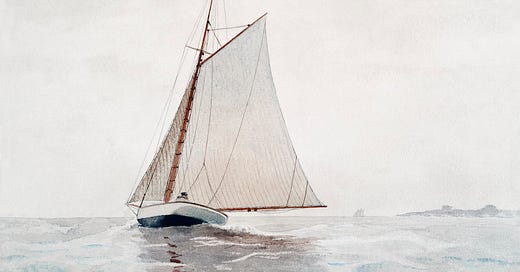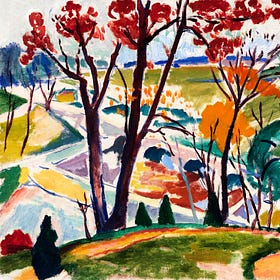Speed is a funny thing. As a society, we crave it — to us, speed equals progress. But to the individuals that make up our society, speed is wearisome. It buffets us like a flag in a terrible wind; it chafes against our skin and our nature until our teeth are set on edge. The nature of this speed is contradictory: on one hand, it feels like my weeks are blazing fast past me. But if I zoom out, it feels like we’re collectively stuck in the same spot in a never-ending traffic jam on the highway of the world. Or like a rock we’re continuously rolling up a mountain only to have it fall to the foot again. To borrow from Sylvia Plath in The Bell Jar:
I felt very still and empty, the way the eye of a tornado must feel, moving dully along in the middle of the surrounding hullabaloo.
We’re living each day frenetically, but when we look back, it feels like we haven’t moved much at all.
The relationship of humans with the natural world is perhaps not one you could plot to the T, because it is very complex. But you can certainly demarcate chapters, points in time where things took a turn for the better, or the worse, or for the sake of taking a turn. German sociologist Gerd-Günter Voß did just that, tracking the ebb and flow of societal movements over centuries to spot patterns. And spot patterns he did.
For much of human history, he found, the route we took was the traditional one we were told to. Your trade was the trade your father, grandfather and great-grandfather passed on to you. Your thoughts about the world were also hand-me-downs, as were the schedules you followed and the way you dressed. You did as your forefathers did. There was a script—battered and used and crumpling at the edges, but a script just the same—and you stuck with it.
And then, with the turning of the gears of modernity, came the strategic life with a plan. Instead of being merely a footnote in the grand tome of life handed down from the ancestors, individuals started authoring their own chapters. They set individual goals in their individual minds and worked backwards from there: go to school to go to Harvard Business School to join a consulting firm to sit in the CEO’s chair to buy the big house in Miami to retire rich. Or drop out of school to build a startup to sit in the CEO’s chair to buy the big house in Miami to sell the big house in Miami to retire and make million-follower YouTube videos. Suddenly, everyone had their own script.
But now, as all that is solid melts into the air and all that we have done is becoming undone, we inhabit a third, more reactionary, more agitated model of life: the situational. Because of what the sociologist Hartmut Rosa calls “social acceleration”, the increase in the tempo of life, we’re having to make decisions on the fly. There’s not much room for strategy, and decision-making becomes a series of knee-jerk reactions. When the storm blows relentlessly, we focus not on where we’re going, or where we came from, but on how to keep this boat from capsizing, and taking us under with it. It’s baked into our bones.
The remedy to this, like the remedies to all other things equally complex, is deceptively simple. It is to step away: back into the past and forward into the future. It is to expand our temporal bandwidth, the width of our present moment, the now, to include more of the past and more of the future. Of expanding into the past, Alan Jacobs explains in his wonderfully titled book Breaking Bread with the Dead:
It’s a kind of judicious stepping back, the taking of a few deep breaths before plunging back in. An opportunity for reflection, a reminder that there are, to borrow a phrase from Truman Capote, “other voices, other rooms”: people with concerns and hopes and fears quite different from ours, but nevertheless recognisable, just as human as ours are.
You’d be hard-pressed to immediately find someone more invested than I am in this philosophy of intentionally encountering and engaging with the past. That is the very premise of this particular creative endeavour you are currently reading and are subscribed to: old alchemy for a young century. To read about the past is to decenter ourselves. However temporary, this decentering floods us with much-needed perspective, and gives us an out from the frenetic standstill we seem to be otherwise locked into.
To read about the future, on the other hand, is an exercise in foresight. Expanding our temporal bandwidth in this direction means not only imagining the direct consequences of our actions but also considering the second, third, or even hundredth ripple effect. It's about asking ourselves: If I take this step today, where might it lead me in a year, a decade, or even a lifetime? Thinking many many years into the future puts into perspective some decisions we may think is world-ending or world-changing. Many a dark thought has been dispelled by the hope brought in through the curtains by the morning sunshine; many a looming decision has become minor, even insignificant, in the face of the years that lie ahead of us.
In a world that often feels like it's spinning out of control, expanding our temporal bandwidth gives us an anchor. It offers us a chance to shift from reacting to the world around us to channeling our energy towards whatever aligns with our deepest values and aspirations and those of our communities. It’s a sort of gift: of mental freedom, of unnecessary weight lifted off shoulders, of rocks perched perfectly at the top of the mountain so we might catch our breath at the foot.






"old alchemy for a young century"
I love this!
"Thinking many many years into the future puts into perspective some decisions we may think is world-ending or world-changing. Many a dark thought has been dispelled by the hope brought in through the curtains by the morning sunshine; many a looming decision has become minor, even insignificant, in the face of the years that lie ahead of us."
Getting your perspective changed can be magic-like. It has changed my world many a times. When I see myself as this dot in between all the years that have been and the ones yet to come, everything seems indeed smaller, sometimes pointless and I'd say even possible.